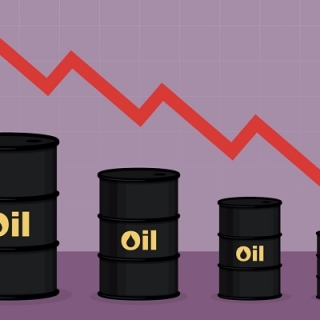


Oil extended declines after OPEC+ agreed to a bigger-than-expected production increase next month, raising concerns about oversupply just as US tariffs fan fears about the demand outlook.
Brent slid as much as 1.6% toward $67 a barrel after falling 0.7% on Friday, and West Texas Intermediate was below $66. The group led by Saudi Arabia decided on Saturday to increase supply by 548,000 barrels a day, putting OPEC+ on track to unwind its most recent output cuts a year earlier than planned.
Alliance officials cited summer demand as one reason for their optimism that the extra barrels could be absorbed by the market, with the move answering President Donald Trump's calls for lower fuel costs.
The oil market has been volatile in recent weeks following the conflict between Israel and Iran, with a fragile truce now in place and focus shifting to OPEC+ supply and US trade policy. Trump's country-by-country tariffs will take effect Aug. 1, Commerce Secretary Howard Lutnick said, signaling some breathing room for trading partners ahead of a previous deadline of July 9.
OPEC+ previously announced hikes of 411,000 barrels a day for May, June and July — already three times faster than scheduled — and traders had expected the same amount for August. The increase amplifies a dramatic strategy pivot, from years of output restraint to reopening the taps to reclaim market share.
The group is "clearly taking advantage of a period of tightness in global energy markets," said Robert Rennie, the head of commodity and carbon research at Westpac Banking Corp. However, there are "downside risks" to oil prices as seasonal demand wanes after summer, he added.
The boost was based on "a steady global economic outlook and current healthy market fundamentals," the group said in a statement on Saturday. Saudi Arabia followed with a price increase to its main crude grade for Asia next month, signaling confidence the market can withstand the extra OPEC+ supplies.
The alliance will consider adding another 548,000 barrels a day in September at its next meeting on Aug. 3, according to delegates, which would complete the revival of 2.2 million barrels a day of cuts made in 2023.
Brent for September delivery was 1% lower at $67.62 a barrel at 10:25 a.m. in Singapore.
WTI for August delivery declined 1.7% to $65.84 a barrel from Thursday's close.
There was no settlement on Friday due to the US holiday.
Source : Bloomberg
Oil fell after US President Donald Trump rolled out stiff tariffs on major trading partners, including China and the European Union, ratcheting up a trade war that threatens global demand. West ...
Oil headed for a third weekly decline as worries that President Donald Trump's tariffs on China will sap demand outweighed the new US administration's first round of sanctions against Iran. West...
Gold prices briefly caused a stir after hitting a new record, but then slowed. The main trigger: US President Donald Trump withheld the threat of tariffs on Europe and claimed there was a "framework" for a future agreement on Greenland. This calmer...
Oil prices were little changed in Asian trading on Thursday after US President Donald Trump backed down from a threat to impose tariffs on European countries over Greenland. This decision helped ease geopolitical tensions and improve market...
The Nikkei 225 Index climbed 1.73% to close at 53,689, while the broader Topix Index rose 0.74% to 3,616 on Thursday, snapping a five-day losing streak as Japanese shares were lifted by a strong rally in chip and artificial intelligence related...